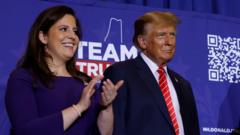In the wake of Donald Trump's electoral victory, a clearer picture of his anticipated policies and governance style has started to emerge, largely shaped by his appointees. These choices suggest a recommitment to hardline immigration policies, a strong stance against China, and an emphasis on presidential power.
**Immigration Policy Redux**
Trump’s selection of close advisor Stephen Miller as deputy chief of staff for policy indicates a resumption of strict immigration tactics heralded during his first term. Miller, known for his integral role in crafting stringent immigration laws, reinforces Trump's commitment to mass deportations, a point echoed by Thomas Homan, appointed as the "immigration tsar." Homan, too, has a history of backing controversial measures, emphasizing the administration's readiness to escalate deportations and reduce foreign immigration.
Critics argue that these measures could be economically burdensome, with potential costs exceeding $300 billion, yet Trump remains unfazed, prioritizing safety and national interest over financial implications. This aligns with a continued focus on immigration as a central theme of his policy approach.
**Confronting China**
On the foreign policy front, Trump's appointments resonate with a hawkish rhetoric towards China. Florida Congressman Mike Waltz, named as national security adviser, reflects a consensus among some Republicans that view China as a formidable adversary. Meanwhile, Congresswoman Elise Stefanik's nomination for UN ambassador highlights a combative stance on perceived Chinese interference in U.S. affairs, marking a potential shift towards aggressive diplomatic engagement similar to Trump's previous term.
These personnel decisions suggest that the Trump administration may adopt a confrontational posture, likely aggravating existing tensions between the U.S. and China, particularly in relation to trade concerns and international diplomacy.
**Power Play and Loyalty**
Trump's approach to appointing personnel contrasts sharply with his initial term, marked by reliance on traditional Republican figures. In his second term, he appears to prioritize loyalty, surrounding himself with loyalists like South Dakota Governor Kristi Noem and conservative media figure Pete Hegseth. This strategy underscores Trump's intent to consolidate executive power, as seen by his inclination towards making recess appointments, potentially sidelining Congress's role in approving appointees.
Despite control of the Senate, Trump seems more inclined to forge his path through executive actions rather than engaging in collaborative legislative efforts. This could reshape the dynamics of governance and legislative effectiveness in his new term.
**The Shadow Cabinet**
Additionally, prominent figures like Elon Musk are emerging as influential advisors within Trump’s circle. Musk's involvement in administrative discussions hints at a blurred line between political advisory roles and business interests, raising questions about the impact these ties could have on policy and appointments.
Meanwhile, Robert F. Kennedy Jr.’s role in advancing public health initiatives, post his endorsement of Trump, further illustrates the eclectic mix of personalities influencing Trump's agenda.
In conclusion, Trump's initial appointments and statements point to an administration prepared to pursue aggressive immigration reform, confrontational foreign policy, and a consolidation of executive power, all while rewarding loyal supporters. As Trump navigates the coming years, the insistence on loyalty and the method of governing through executive action signal a pivotal pivot from standard legislative interactions, setting the stage for another distinctive term in office.
**Immigration Policy Redux**
Trump’s selection of close advisor Stephen Miller as deputy chief of staff for policy indicates a resumption of strict immigration tactics heralded during his first term. Miller, known for his integral role in crafting stringent immigration laws, reinforces Trump's commitment to mass deportations, a point echoed by Thomas Homan, appointed as the "immigration tsar." Homan, too, has a history of backing controversial measures, emphasizing the administration's readiness to escalate deportations and reduce foreign immigration.
Critics argue that these measures could be economically burdensome, with potential costs exceeding $300 billion, yet Trump remains unfazed, prioritizing safety and national interest over financial implications. This aligns with a continued focus on immigration as a central theme of his policy approach.
**Confronting China**
On the foreign policy front, Trump's appointments resonate with a hawkish rhetoric towards China. Florida Congressman Mike Waltz, named as national security adviser, reflects a consensus among some Republicans that view China as a formidable adversary. Meanwhile, Congresswoman Elise Stefanik's nomination for UN ambassador highlights a combative stance on perceived Chinese interference in U.S. affairs, marking a potential shift towards aggressive diplomatic engagement similar to Trump's previous term.
These personnel decisions suggest that the Trump administration may adopt a confrontational posture, likely aggravating existing tensions between the U.S. and China, particularly in relation to trade concerns and international diplomacy.
**Power Play and Loyalty**
Trump's approach to appointing personnel contrasts sharply with his initial term, marked by reliance on traditional Republican figures. In his second term, he appears to prioritize loyalty, surrounding himself with loyalists like South Dakota Governor Kristi Noem and conservative media figure Pete Hegseth. This strategy underscores Trump's intent to consolidate executive power, as seen by his inclination towards making recess appointments, potentially sidelining Congress's role in approving appointees.
Despite control of the Senate, Trump seems more inclined to forge his path through executive actions rather than engaging in collaborative legislative efforts. This could reshape the dynamics of governance and legislative effectiveness in his new term.
**The Shadow Cabinet**
Additionally, prominent figures like Elon Musk are emerging as influential advisors within Trump’s circle. Musk's involvement in administrative discussions hints at a blurred line between political advisory roles and business interests, raising questions about the impact these ties could have on policy and appointments.
Meanwhile, Robert F. Kennedy Jr.’s role in advancing public health initiatives, post his endorsement of Trump, further illustrates the eclectic mix of personalities influencing Trump's agenda.
In conclusion, Trump's initial appointments and statements point to an administration prepared to pursue aggressive immigration reform, confrontational foreign policy, and a consolidation of executive power, all while rewarding loyal supporters. As Trump navigates the coming years, the insistence on loyalty and the method of governing through executive action signal a pivotal pivot from standard legislative interactions, setting the stage for another distinctive term in office.

















